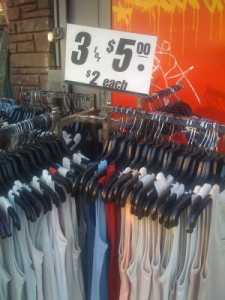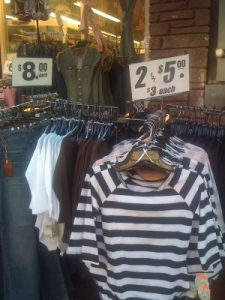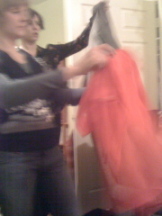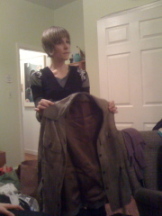Entries from February 1, 2008 - February 29, 2008
Clothes!
 Those of you keeping track will notice that a good quarter of the things I've purchased in 08 have been clothes. Frankly, I've done more shopping in the last two months than I did in the previous two years. I'm shocked that it's managed to keep my interest -- I guess the research-project aspect of it and more money to spend have made it tolerable. There's a huge spectrum of options out there, ranging from sweatshop-tastic to mittens made from pampered bunnies hand-combed to yield a special angora. I thought I'd report back, and pose some questions to the people out there challenged by similar issues.
Those of you keeping track will notice that a good quarter of the things I've purchased in 08 have been clothes. Frankly, I've done more shopping in the last two months than I did in the previous two years. I'm shocked that it's managed to keep my interest -- I guess the research-project aspect of it and more money to spend have made it tolerable. There's a huge spectrum of options out there, ranging from sweatshop-tastic to mittens made from pampered bunnies hand-combed to yield a special angora. I thought I'd report back, and pose some questions to the people out there challenged by similar issues.
At the "worst for the environment and for people" end of things, I finally went to H&M to redeem the gift certificates I received last summer. I didn't actually spend any of my money though I did articulate the opinion that cheap throwaway clothes - jeans and a work shirt - are something people want. I noticed one shirt in the store that was made of organic cotton, a step in the right direction, but I didn't need it for anything and it was ugly besides. I have a couple more certificates that I will use, and then I will try to say goodbye to H&M forever. It's been a mainstay for basics and things that don't get heavy use, like work clothes.
I also went into Old Navy to look for some T-shirts that a friend recommended. They didn't have a single one in my size, so I cruised over to the clearance table. $2.99 for a long-sleeved tee! Wow! -- But wait, it's a funny color. -- But it's only $2.99! And it looks really cozy! -- "Made in El Salvador." 'Made in Vietnam." "Made in Cambodia." -- I started to feel a little sick: this shirt definitely didn't cost $2.99. I know it's just a little 8oz shirt but I'm sure there's a fuel cost -- and packaging costs and equipment costs and the costs of paying the Old Navy workers, not to mention the amount the Vietnamese factory worker SHOULD be getting. Increasingly freaked, I just walked out of the store.
 I still need t-shirts. The ones I bought a couple of years ago are worn out completely. Not only do they have to be the right size, have the right feel, the right weight, the right colors, it would be great if they could be made locally of organic cotton in a certified fair-trade environment. But I don't think they have local organic fair-trade t-shirts. So I have to pick one or some of these criteria. I will probably be able to afford a couple American Apparel shirts (sweatshop free?), but their organic selection is very small. I don't know of any major retailer who is making basic organic cotton t-shirts that I can try on somewhere. Most of the organic clothes places I've found make stuff that seems pretty coarse and hippie-ish. Let me know if you have any ideas.
I still need t-shirts. The ones I bought a couple of years ago are worn out completely. Not only do they have to be the right size, have the right feel, the right weight, the right colors, it would be great if they could be made locally of organic cotton in a certified fair-trade environment. But I don't think they have local organic fair-trade t-shirts. So I have to pick one or some of these criteria. I will probably be able to afford a couple American Apparel shirts (sweatshop free?), but their organic selection is very small. I don't know of any major retailer who is making basic organic cotton t-shirts that I can try on somewhere. Most of the organic clothes places I've found make stuff that seems pretty coarse and hippie-ish. Let me know if you have any ideas.
The closest I got to local clothing was buying some stuff from a couple of New York designers that I really like. They're not still small enough to be manufacturing the stuff by hand in the shop, like when they started, but they are both quite involved in the production and sales of their designs. Meg, one of them, told me how she's trying to move her Pakistani fabricating shop into the same building as the store -- she's been working with the same guy for 15 years. As her business has grown, she has expanded to factories in Canada, Asia, and the Middle East; she told me she's visited every one. It was fun chatting with her about this: I felt a little like I do at the farmer's market.
I also had fun trying some stuff from Nau, a new company that is trying to be both fashionable and sustainable. They use exclusively renewable materials and sustainable processes and describe their sources on their site; I was also impressed by how little packaging the stuff arrived in - just a small envelope made of recycled paper. The cost of these wonderful things is normally beyond my reach; I am looking forward to their New York sale March 6-9. Finally, I bought a pair of shoes for work and for fun; not explicitly "sustainable," they seem to be of high-quality materials and made to be repaired. Shortly afterward, I found this company online: I will look forward to checking out the Terra Plana store in New York when I need shoes again.
I should be clear that I don't think products are the answer to our environmental and social problems. I think as a culture we buy and throw away too many things that we never used and never needed. Of course the things we do need - t-shirts, shoes, toilet paper - must be produced in better ways or soon enough they won't be produced at all. We'll be digging them out of old landfills. With that in mind, at the end of all of this shopping, I went to another clothing swap, the most fun way to get new clothes.



The shopping I did was really shopping: that is, I looked at labels and asked questions and tested things out and compared items. It's time-consuming and things aren't so transparent. At the end of it all, it became even clearer to me that buying used or refashioning something old is the most people- and earth-friendly way to go for a new getup. Still, it's really nice to have something fresh and new every once in a while.
Things that will stick
Handkerchiefs and the library. Seriously. I tried a lot of things last year, and some of them I will probably continue for a long time. But these two I can be sure of.
I started with the handkerchief thing because I knew I would run out of tissues and I was afraid I would run out of toilet paper. I really didn’t want to have to use cloth at the end of 07 – my apartment is small and laundry is not so easy. I asked my grandmother if we could make some handkerchiefs when we had our sewing visit last year; she suggested instead that she give me a stack of old men’s cotton hankies. Perfect! They are soft on the nose and less gross than it might seem. Plus, having a hankie in your bag is great for many things: spilled coffee, a forgotten napkin, etc.
As the daughter of a librarian and a big reader, you’d think the public library would be a no-brainer. But the New York system seemed like all of the other crazy city bureaucracies and since college I’d gotten in the habit of writing in my books and thinking I’d need to go back to them. So I’d been buying books new! Not very often and not very many, but this was a practice I clearly didn’t need to engage in.
Last year I started exploring the options with the NYPL: there is a branch not too far from my house, but even better, there is a tiny branch right by work. I realized that I can’t approach them like bookstores, browsing like I did as a kid, but rather like my mailbox for Netflix. Anytime someone recommends something to me, I put it on my library list online. If 221 other people are waiting for it, I’m sure there’s something else I can read in the meantime, or, I can assess other options, like seeing if a friend has it or buying it used. Eventually my request turns up at the library I choose, and they conveniently send me an email letting me know it’s there. They’ll even hold it for a few weeks if I can’t get to it right away. This little system is so perfect: I’ve read some things that I decided I needed to own, so I bought them used without a second thought.
Not just for my mom’s sake, I have to push this one: please, please, please support your public library, one of the most democratic and First Amendment-positive institutions we have going. It turned out to be way easier than I thought it would be; if I can do it in New York City, you can too.
Let's do the numbers
After all this discussion of impact and the environment and so on, I thought I’d assess Fix in terms of where I can really feel it…in my wallet. Bear with me – I’ve got some creative accounting going on. My system depends on me remembering and recording everything I buy, which I’ve gotten pretty good at after two-plus years. I also kept separate budgets for my big trip and the couple of art projects I did in 06 and 07, so those don’t figure into my averages.
Subjectively, it felt pretty great to whip out my debit card for basically everything, even the bigger things, knowing that there would be cash in my account to cover it. I was thrilled to see my credit card balances going down sharply after years of watching them creep up, and more relaxed about money than I’d felt in a long time. I found myself going to the ATM with much less frequency: part of that was the debit card, but a lot of it was that by simply eliminating buying things I could pretty precisely predict how much cash I would need for a period of time.
Starting with my total expenses, I spent $277.32 less each month in 2007 than I did in 2006. That includes the trips, performance tickets, and credit card payments I paid for with the money I was saving by not buying things!
In “The Rules” I quote a figure for spending on manufactured goods in 2006 (that I can’t get back to) that doesn’t include food; at the time I came up with it, I was including medicine and used items, which I didn’t later prohibit with the rules of Fix. Using these same criteria, I spent $1983.84 on manufactured items in 2007, roughly 1/3 of what I spent in 2006.
Breaking these things down into categories (averaged over the year), I spent 7% of what I did in 06 on stuff for my apartment; 39% on clothes – 5% if you don’t include the smock; 58% on food; and even in my catch-all, “other/misc.,” 77% of what I spent in 06. Spending went down in all of my categories except rent, utilities, and credit cards (which went way up), though the other dips were not as dramatic; I had a pretty big move in 06 – it may not be fair to include the “house” category here.
Finally, by Fix’s rules, my “violations” added up to $408.80 - $34.07 worth of missteps each month; the “questionable items” came to $660.37 - $55.03 per month. Seems like a lot – definitely more than I imagined at the outset.

I’m not exactly sure what all of this means, but it made a pretty big difference in my day-to-day life in 2007. I was glad to have the money, which made me feel more secure and enabled me to have new experiences. I suspect that the theoretical, moral, and scientific arguments environmentalists develop in the short term for buying and using less will be trumped in the long term by the simple fact that oil-based goods -- i.e.: everything -- will become outrageously expensive if not unavailable. So perhaps the personal finance angle - fueled by the mortgage crisis etc. - will be the most effective for the short term, with the added benefit that it makes theoretical, moral, and scientific sense to BUY LESS CRAP.
As for me, I can be a little less worried about losing my job, my apartment, getting sick, etc. I can buy nicer (non-stuff) gifts for the people I love, and take on fewer freelance projects for the extra bucks I always need. With more cash, I can buy higher-quality things that I will take care of better so they last longer. I've already been able to make a couple of donations to organizations that I have long wanted to support. No, money doesn't buy happiness, not directly -- but a lack of it, especially over an extended period of time, can cause some serious stress.
Mending vs. fixing
Hi, I'm sorry I'm posting two short ones in a row - I'm working on something I'll share as soon as possible. This piece was on NPR this weekend; thanks to Dad for passing it along. She gives me some good things to think about: I even considered darning my socks - and never got to it on my days off...(There's always next weekend!)
Susan Cooke Kittredge's This I Believe essay, "We All Need Mending"

